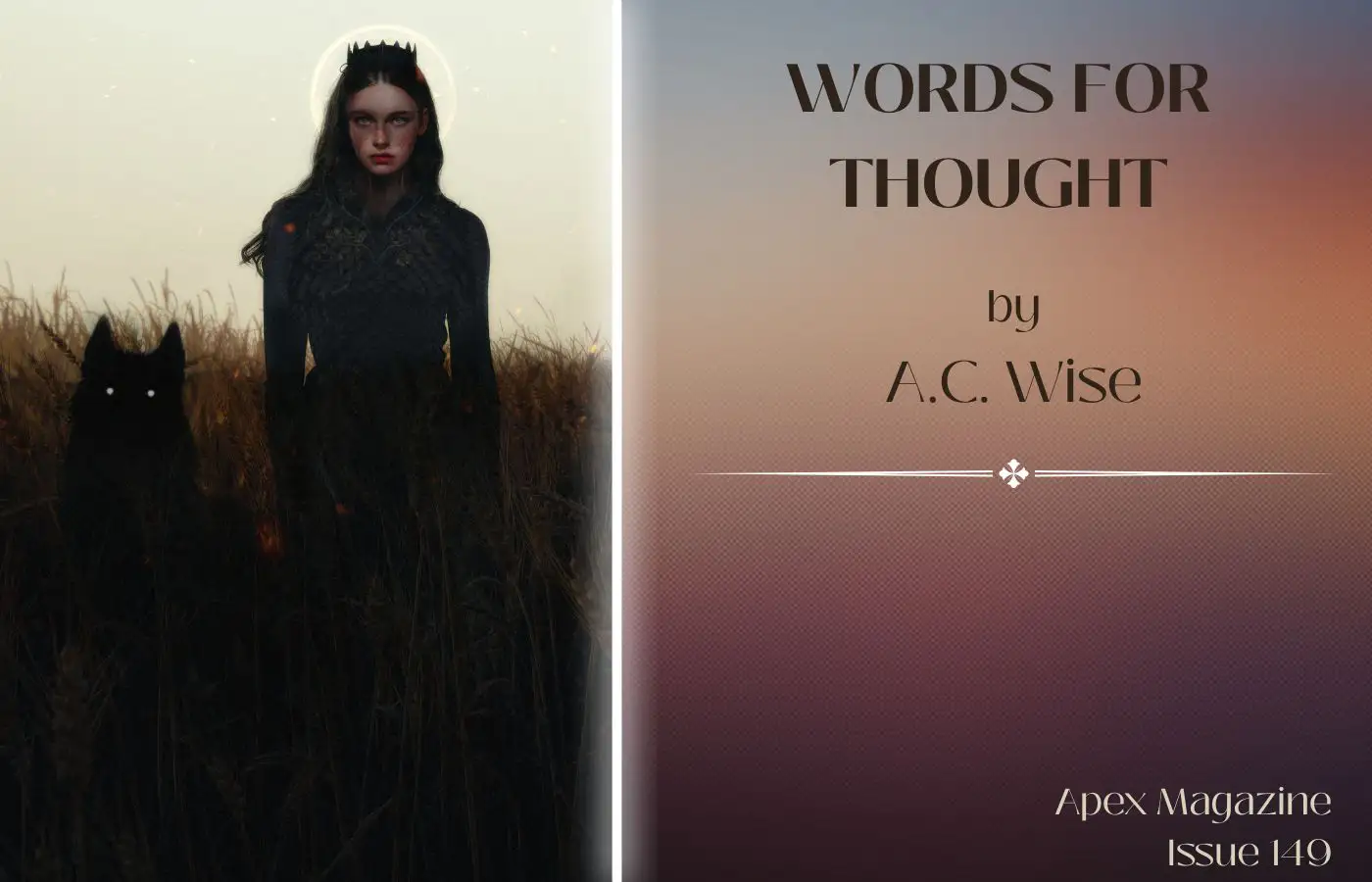
Welcome to another Words for Thought. This time around, I’m looking at stories that deal with memory, perception, loss and letting go, and how all these things might inform and interact with each other. There is often a gap in how we perceive ourselves, versus how others perceive us, and gaps in how different people perceive the world. These four stories delve into those gaps in interesting ways, and all are beautifully written and well worth a read. As always, there are spoilers ahead, so beware!
“Derail” by E. Catherine Tobler published in the December 2024 issue of Bourbon Penn is an achingly gorgeous story about loving someone who only halfway belongs to your world, about learning to see the world from a different perspective, and about learning to let go.
It was always the lowing of the train whistle that woke him from the depths of the bed where he’d somehow gotten. He closed his eyes and listened to the distant train, picturing it racing the tracks, playing catch me if you can with the moonlight glossing their infinite length. The train whistle never stuttered, was always smooth and sure of itself. It called him, a sound he might follow forever, but Nicholas was snug in bed now, his feet warm, and he could feel the weight of a body in bed with him—he wasn’t inclined to leave this sweet space, so let the train steam on.
The story is set in the world of Jackson's Unreal Circus, featured in several other works by the author, but stands alone as a self-contained piece. Nicholas is haunted by his memory of the Circus, packing every night with the intention of leaving, only to find himself back in bed. His lover, August, unpacks again for him each morning, believing Nicholas' yearning to leave is a symptom of his illness—and implied eventual death—not believing the Circus is real until he has his own encounter with Jackson and his train.
The story is beautifully written and suffused with longing—Nicholas’ longing for the half-remembered, Circus, and August’s longing for Nicholas. Both are heartbreakingly portrayed as acts of love, faith, and letting go. Even though August doesn’t believe in the Circus, he believes in Nicholas and fears for him. He hates the idea of losing him but has always had a sense that Nicholas only partially belongs to the world he occupies, knowing that their goodbye is inevitable. At the same time, even though Nicholas does believe in the Circus, it’s been so long since he’s seen it, he isn’t sure he’ll ever get to return, and he does feel the pull to stay, even knowing he can’t.
Both August and Nicholas experience a shift in their worldviews and in the way they see each other by the end, and this shift is necessary for them to gain any kind of closure. Letting go and saying goodbye will always hurt, no matter what, but at least there’s a little bit of magic in this version of goodbye that lets it hurt a bit less as it comes with the promise of eventual healing to temper the loss.
“Lento, Amargo Animal” by Rich Larson also happens to appear in the December 2024 issue of Bourbon Penn. It has a similarly strong voice and lovely writing, but the approaches themes of loss, perception, memory, and letting go from a different angle.
It always starts with a drink in Todo Bien, a beachside bar that burns perpetually to the ground. Holographic flames lick and crackle on all sides. Deionized smoke billows across the floor. The servers wear rippled skinsuits, artificial grotesqueries that turn your empty stomach before the mezcal torches it entirely.
The narrator first encounters Frida in her social media feed before ever meeting her in person. Already, the idea of the curated image, and how a person presents themself publicly versus privately is at the core of their relationship. Frida and the narrator do eventually meet in person and form a relationship, but by the end of the story, it’s revealed that what the reader is seeing is a simulation that the narrator is inhabiting. The simulated Frida, on learning the truth, accuses the narrator of practicing within a heavily edited, heavily filtered version of reality in order to make their next encounter with the real Frida go perfectly.
What seems more likely, however, is that the narrator and the real Frida will never see each other again. All the narrator has is their memory, which they can script and perfect to their heart’s desire, though there will always be a hollowness to the encounter. This idea is echoed by the narrator’s response to Frida’s initial accusation—that everyone is always interacting with some versions of others that exists solely in their heads, raising the question of whether it’s even truly possible to know another person at all. We are all constantly filtering our experiences, and we are all constantly projecting forward to imagine how encounters might go and reaching backward to alter our memories either through our own biases, or misremembering. Along with the intriguing setting and characters, the story does a nice job of looking at perception and how it intersects with objective reality. Must reality always be somewhat subjective based on how individuals process their experiences?
“Memories Held Against a Hungry Mouth” by Ann LeBlanc, appeared in the March 2024 issue of 3-Lobed Burning Eye. I encountered the story late last year while frantically trying to catch up on things I’d missed, and it’s well-worth going back to read.
Professor Iris believes there is nowhere better to eat a sandwich than a folding chair set ten meters across the border where the world dissolves into epistemological blankness. Ten meters in, and the world feels wrapped in cheesecloth, protecting her against the guilt that assails her in more concretely real settings. All the better to focus on the sandwich’s symphony of taste and texture.
Professor Iris has devoted her career to studying the Blank, a phenomenon that eats pieces of people and erases all knowledge of those pieces, like taking a person and leaving their empty house behind. The house evokes a sense of loss, but no one who experiences that loss can recall its source.
As with Tobler and Larson’s stories, memory, absence, and perception are all central themes running through the piece. Iris knowingly lets her obsession with the Blank devour other pieces of her life, including her grad students and parts of her lover, which raises the question whether the parts of Iris that would care about what she's sacrificed have been eaten away as well, or whether she has always been this—uncaring and thus perfectly primed to develop an obsession with the Blank. It’s sort of a chicken and egg question—must Iris find answers in order to justify the sacrifices she’s made, or is the very existence of the Blank all the justification she needs, with the sacrifices not truly being sacrifices at all?
The voice in this piece is strong and distinctive, and again, like the other stories mentioned here, the writing is lovely. The way the story interrogates identity and external influences on shaping identity versus core identity shaping the way we experience the world is quite interesting. It feels like this piece and Larson’s could be in direct conversation with each other at their philosophical cores.
“Pelt” by Steven Archer appeared in Strange Horizons in July 2024. It’s another story I encountered late last year while trying to catch up on what I’d missed, and it’s truly excellent—lovely and heartbreaking in its exploration of complicated family relationships and people taking the first steps toward seeing the world through each other’s eyes.
Louis dances under the name Luz Divinity. His mother refuses to accept the fluidity of his gender, leading to a largely estranged relationship. However Louis’ brother asks him to come home to celebrate his niece's first birthday party, and he reluctantly agrees. Their father will be there as well, even though he left the family. His second wife died recently, and Louis’ brother wants to reconcile with him, wanting his daughter to know her grandfather, and wanting Louis to be part of that reconciliation as well.
Luz Divinity stares out of the mirror fully stamped. Her work tonight won’t cover a hotel. It’s decided, then, what I’ll answer in the morning, and the thought of this fate is enough to finish the job; I pull on my earlobe and feel the molt detach, chemically peeled by my mother’s words. I flush it away and dab more foundation on the fresh skin underneath, so my ear will match the rest of me.
Louis’ skin molts, a trait shared by the women in his family, the emotional pain they experience literally stripping pieces of them away. Louis’ mother refuses to acknowledge that it could happen to Louis as well, choosing not to see him for himself, which in turn leads Louis not being able to see certain things about his mother, or his father either for that matter.
Over the course of his time with his family, Louis begins to understand his father’s grief and all the pieces of herself that his mother has shed and kept hidden away. The story is well served by not tying everything up neatly, but only opening the door to a greater understanding between family members, which keeps the characters feeling grounded. Overall, the story is a lovely, bittersweet, and painful look at not being seen, or someone deliberately refusing to see you, and complicated family relationships where you love someone, even though that love and understanding feel as though they aren’t returned.










